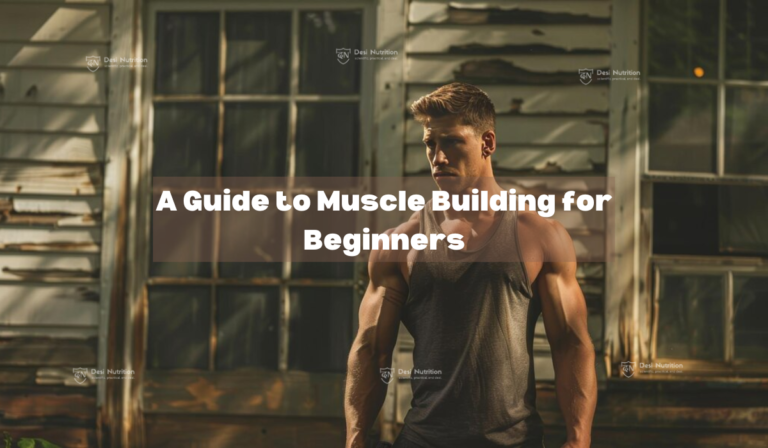Muscle building is in trend nowadays, but are you opting for muscle building because of the trend or do you really want to enhance your overall health? Oh, you didn’t know muscle building is not just to get a toned physique but to promote overall health as well? Well, this is the right place for you if you are a beginner because this article is the ultimate guide to building muscle for beginners.

Muscle building helps to increase your metabolism which eventually helps you burn more calories even at rest. It will also help to strengthen your bones and reduce the risk of injury. You will also experience improvements in your mental health.
Though beginners might find it difficult or overwhelming to start with a muscle-building routine, it has numerous benefits and it also aids in weight loss and management in the long run.
In order to start your journey to build muscle, you need to:
Set clear goals:
Setting clear goals is the first and crucial step in the journey of muscle gain. You need to be clear and specific when setting your health goals. First, identify your need to start on the journey. It is just about gaining muscle, a toned physique, or your overall health, or maybe you are including strength training as a part of your weight loss regimen.
Setting clear goals gives you clarity and keeps you motivated throughout the journey. Set goals based on the principle of SMART. SMART is an acronym for Specific, Measurable, Achievable, Relevant, and Time-bound goals. Working on this principle to set your goals will help you set clear goals that you can further break into small goals to get the best results.
Specific: Clearly define your goal.
Measurable: Ensure you set goals that you can measure from time to time.
Achievable: Set realistic and achievable goals so you do not push your body beyond its limits and do not get disappointed when you do not perform as expected from yourself.
Relevant: your goals should be relevant to your main objective. Set goals that help you to fulfill your main health objective.
Time-bound: Working on time-framed objectives will help you be accountable for your actions. Ensure to set a timeline for a particular goal so you can be motivated to achieve this goal.
Understand the basics of muscle growth

Before starting on the journey of muscle growth you need to understand the basics of it to effectively set your goals and understand how it works.
Muscle hypertrophy
Muscle hypertrophy is the result of a process that occurs when muscle fibers are damaged or experience tears on a microscopic level. This is the result of your muscles undergoing tension or stress because of exercises. This damage is repaired when the fibers fuse themselves which leads to an increase in the muscle mass and size. This process is the result of various factors including nutrition, proper rest, and consistent training.
Hypertrophy is of two types, namely myofibrillar hypertrophy and sarcoplasmic hypertrophy.
Myofibrillar hypertrophy results in stronger and denser muscles because it increases the size and number of myofibrils.
Sarcoplasmic hypertrophy results in larger and more voluminous muscles but won’t increase strength. This is the result of an increase in the volume of sarcoplasm.
Progressive overload:
Progressive overload means to increase the resistance on your muscles gradually with time. Ensure to start your exercise routine with bodyweight exercises, especially if you are losing weight. Increase weights to your exercise gradually and try to do so after every few weeks.
Focus on increasing sets and reps if you feel like adding weight is not just right. Increase the number of sets you do and also ensure to do more reps of the same set.
Decreasing rest time gradually will also help you to build muscles because it increases the intensity of your workout.
Keep on rotating and changing the exercises that target the same muscle group to provide new stimulus for growth.
Consistency and variations:
Consistency is the key when it comes to muscle building. Stick to a regular schedule to get effective results. Your muscles need to experience stimulation consistency to repair and build themselves and grow in size and gain more strength.
Ensure to introduce a variety of exercises in your muscle building regimen to prevent plateaus and keep challenging your muscles.
Create an effective workout plan for muscle-building

A well-rounded muscle-building plan that includes exercises for all your muscle groups. Ensure you have an effective workout plan that aligns specifically with your health goals. To build muscle your workout plan should include a mix of compounds and isolation exercises which will cover all the major muscle groups and provide adequate rest periods.
Compound exercises:
Compound exercises are those which involve multiple joints and muscle groups making them highly efficient for building overall strength and muscle mass. These exercises help to build muscle but also enhance coordination and functional strength.
For example, squats, deadlifts, bench presses, and pull-ups.
Isolation exercises
Isolation exercises target a single joint and specific muscle group which helps you to focus on muscle definition and correcting imbalance. These are effective for a particular muscle group but not for overall muscle mass.
For example, bicep curls, tricep extensions, and leg curls.
Warm-up
Start by warming up so you can increase your blood flow to your muscles and prepare your body for the workout. Give your 5-10 minutes of light cardio and stretching.
Cool-down
You should end your workout with a cool down so your muscles can recover and reduce soreness. Cool down by including static stretches and light cardio.
Adjust your plan
Continue to evolve your workout plan as you progress on your journey. It will help you to build muscle continuously. Evolving your workout plan will also help you to challenge your muscles. Make adjustments every few weeks, like increasing your weights, changing exercises, or altering the number of sets and reps.
Nutrition for muscle building

Nutrition is crucial for building muscles. You need to ensure that you are eating nutritious food and a balanced meal in your muscle gain journey. Do not compromise on nutrition or else you might not see effective results. Ensure to follow a muscle-gain meal plan for effective results. In this section, we will understand the concept of nutrition for muscle gain.
Calorie surplus:
If your aim is to gain muscle mass you need to create a calorie surplus. This means you have to consume more calories than your body burns. A calorie surplus is necessary for the body because it needs extra energy to support muscle growth.
Determine your calorie needs by the following ways:
- Calculate your basal metabolic rate (BMR) which is the number of calories your body needs to maintain physiological functions. You can get your BMR using various online calculators. They estimate your BMR based on your age, gender, weight, and height.
- Determine your total daily energy expenditure (TDEE) which is the outcome of your BMR multiplied by an activity factor that reflects your daily physical activity level like sedentary, lightly active, moderately active, or very active.
- Add a caloric surplus which is necessary to build muscle. You need to add at least 250-500 calories to your TDEE and the number of calories will be adjusted based on your progress and goals.
Macronutrients:
Our body needs the three essential macronutrients, namely, protein, carbohydrates, and fats which are essential for muscle growth.
- Protein is for weight loss as well as muscle gain because it is essential for muscle growth and repair. Protein is the building block of our muscle tissues and it helps to repair them. Include protein sources in your diet such as lean meats, fish, eggs, poultry, dairy products, tofu, tempeh, legumes, and other protein supplements (if suggested).
- Carbohydrates are essential because they provide energy to your body which you need for workouts and for recovery. Focus on consuming complex carbs like whole grains, fruits, vegetables, and legumes. Complex carbs are essential for the body because they provide a sustained form of energy.
- Fats are essential for hormone production which includes the hormones that support muscle growth. Ensure to focus on healthy fats that one finds in natural food sources like avocados, nuts, seeds, and olive oil.
Meal timing and frequency:
- Ensure to focus on portion control in your meal and keep it balanced in terms of nutrition. Meal and timing and frequency also plays a major role in your journey of muscle gain.
- Consume a meal 2-3 hours before your workout so your body can get energy and essential amino acids that will fuel you and prevent muscle breakdown.
- 20-60 minutes after your workout you should consume a protein-rich meal along with carb content in it would help kickstart the muscle process. It will also help in restoring glycogen stores.
- Try to eat 4-6 small meals (including snacks) a day to ensure a steady supply of nutrients and energy throughout the day.
Hydration:
Hydration is another crucial aspect of muscle gain. Staying hydrated is important for overall health and muscle function. If you do not drink an adequate amount of water it will impair your performance and recovery.
Aim to drink at least 3-4 liters of water per day to stay hydrated and ensure you are fully hydrated to support your muscle growth and repair process. Drinking adequate amounts of water throughout the day will also help you to stay active and sweat heavily.
Supplements:
Some people also take supplements that contribute to muscle building by creating a caloric surplus. Supplements like protein powder, creatine, or branded-chain amino acids.
Frequently Asked Questions
How should a beginner build muscle?
Ans. A beginner should not push their body to do vigorous exercises to build muscles. If you are a beginner at this you need to start slowly and gradually make additions to your muscle gain regimen. Nutrition and exercise will play crucial roles in your muscle gain journey. You will have to start with light exercises and then keep evolving your exercise routine. Focus on eating healthy foods and creating a caloric surplus.
How quickly can a beginner gain muscle?
Ans. A beginner could see effective results in their muscles in around 8 weeks, required that they are following an exercise routine and focus on getting proper nutrition under excerpt supervision.
Is a 30-minute workout enough to gain muscle?
Ans. If you are a beginner at gaining muscle, you do not have to spend hours in the gym to get quick results. There is no such thing as quick results as long as you are safely approaching the muscle gain regimen. To gain muscle you have to find a balance between cardio and strength training; so a 40-60 minute workout 3 times a week is also enough for you to start on the journey of muscle gain.




